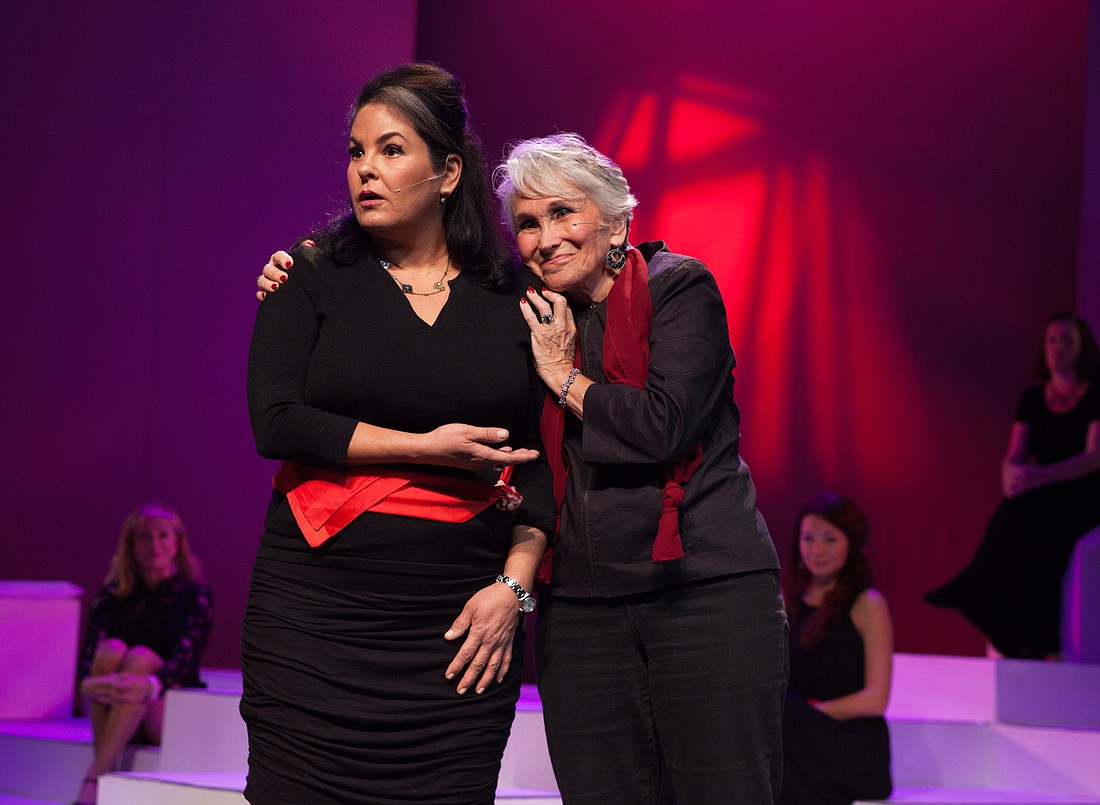- May 27, 2025
-
-
Loading

Loading

Women’s self-image and the fascism of fashion. It’s sometimes an uneasy fit. Nora Ephron and Delia Ephron’s “Love, Loss, and What I Wore” explores the pinch points at The Players Centre for Performing Arts.
The play adapts Ilene Beckerman’s 1995 book as a series of monologues and ensemble scenes. In this production, seven women actors play 28 characters. Their performances are low-key and conversational. It’s as if you’re hanging around with friends who’ve dropped their guard.
Women’s love/hate relationship with their clothes (and the bodies underneath) is what it’s all about. This breaks down to prom dresses, the hegemony of black, the agony of buying bras, the iconography of Madonna, weight wars, dressing room disasters, the fear and loathing of purses, and enough mother issues to give Freud a run for his money.
The play’s hilarious vignettes include a riff on motherly fashion tips. (“Don’t wear stripes and prints together,” “Is that what you’re wearing?” and “Always wear clean underpants in case you die in a car accident.”) But humor alternates with heartbreak. Body shaming and rape are also on the table.
Under Carole Kleinberg’s sharp direction, the actors deliver honest performances without any hype.
Gingy (Alana Opie) is the narrator and central character. (She clearly stands for Beckerman.) She relates the juicy details of her three marriages, three divorces, the birth of six children and the loss of one child. Gingy marks each life passage with dry wit and an article of clothing. Diana Budur’s Rose is moving when she recalls her late mother’s blue bathrobe. (She died when Rose was in pre-school. Her mother’s bathrobe is the only detail the adult Rose can see in her mind’s eye.) Susan Lowe is equally touching relating a cancer survivor’s defiant embrace of breast reconstruction and a sexy push-up bra. Jennifer Kwiatkowski hilariously dithers between comfy boring flats and painful, boring high heels. Michelle Snyder regales the audience with her quest for the perfect wedding garment — which turns out to be a tux for a same-sex marriage. Sandra Musicante and Trudie Kesler are winning as the play’s two all-purpose mothers. Somehow, they manage to be simultaneously supportive and judgmental. (It seems impossible. The gasps of recognition in the audience say otherwise.)
Jeffrey Weber’s set is simplicity itself. Just an array of platforms and blocks where the actors can sit or stand. (It’s non-literal, but hints of a mall dressing room.) Tim Beltley’s costumes walk the fine line of defining character and not defining it. “You are not what you wear” is one of the play’s key points. Beltley doesn’t alter it.
“Love, Loss, and What I Wore” digs into the arcane algebra of female fashion. “Everything You Wanted to Know About Women’s Clothing But Were Afraid to Ask” would make a great alternative title. But there’s clearly more to it than women’s clothing.
Marcel Proust wrote “Remembrances of Things Past” after the taste of a pastry unlocked his buried past. In the Ephrons’ play, clothing is the key. The memories it releases are bittersweet, hilarious, disturbing and all-too-human. The stories on stage are sure to unlock a horde of memories in the audience.